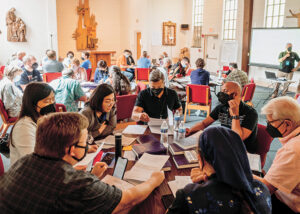So how are we doing 490 years later?
We who anchor our faith expression in what has come to be called Anabaptism over nearly five centuries now number 1.7 million all over the globe and counting. What began in Zurich, Switzerland, during the Reformation in western Europe with the baptizing of break-away religious leaders George Blaurock and Conrad Grebel (see “The birth of Anabaptism in fire and water,” March 16, 2015 issue) has now blossomed into 83 countries around the globe.
Dominated for many centuries by leadership and numbers in western Europe and North America, the demographics have now shifted dramatically in this century to Africa, Asia and Latin American countries. Our Mennonite World Conference, to convene this July for the 15th time, is now led by César García of Colombia, having taken over the reins of leadership from a long line of North Americans.
Even in North America, there has been a kind of “homecoming” to the Anabaptist expression as voiced by Stuart Murray, a Baptist minister/scholar from England and the founder of the Anabaptist Network, and by Gregory Boyd, the courageous pastor of a 5,000-member congregation in St. Paul, Minn., who lost a fifth of his membership after preaching a series of sermons on “The cross and the sword.” The cause for the membership exit, according to the New York Times, was Boyd’s insistence that the “church should steer clear of politics, give up moralizing on sexual issues, stop claiming the United States as a ‘Christian nation’ and stop glorifying American military campaigns.”
It is perhaps fitting, then, that we look to these neo-Anabaptists for a report card on how we are doing five centuries later. Murray and Boyd are perhaps the best spokespersons to do this as newcomers to the faith. In his widely circulated book, The Naked Anabaptist, Murray strips down the essence of Anabaptism in our modern post-Christendom setting to seven core values:
- Jesus is our example, teacher, friend, redeemer and Lord, the source of our life, the central reference point for our faith and lifestyle.
- Jesus is the focal point of God’s revelation; we are committed to a Jesus-centred approach to the Bible.
- In a culture of churches ill-equipped for mission, Anabaptism has rejected Christendom assumptions and pursued alternative ways of thinking and behaving.
- We are exploring ways of being good news to the poor, powerless and persecuted, aware that such discipleship may attract opposition.
- Our churches are to be committed communities of discipleship and mission, places of friendship, mutual accountability and multi-voiced worship.
- Spirituality and economics are interconnected, calling for living simply, sharing generously, caring for creation and working for justice.
- We are committed to finding nonviolent alternatives and to learning to make peace between individuals, within and among churches, in society and between nations.
In an address to pastors in January at Anabaptist Mennonite Biblical Seminary, Elkhart, Ind., Boyd echoed some of the same challenges facing traditional Anabaptists:
- Detach our identity, values and mission from our distinctive ethnicity and culture as much as possible and, instead, anchor these in our distinctive kingdom theology, values and practices.
- Let go of whatever vestiges remain of the isolationist mindset of traditional Anabaptism and, instead, intentionally move outside our comfort zone to forge, cultivate and nurture relationships across ethnic and culture lines. We will need to learn how to not merely tolerate, but authentically celebrate, the diversity of other ethnicities and cultures. Imagine a worship service in which an older white ethnic Mennonite happily dances to loud reggae rock while a Jamaican neo-Anabaptist with waist-length fluorescent dreadlocks joins in four-part harmony, and you have a glimpse of what traditional Anabaptist groups need to strive for.
- Explore creative ways of connecting with the neo-Anabaptists as we assume a learning posture in dialogue with them. Traditional Anabaptists must be willing to receive a rekindled appreciation and fiery passion for the beautiful vision of the kingdom that was given to them 500 years ago, but that has for many come to be taken for granted.





Leave a Reply
You must be logged in to post a comment.